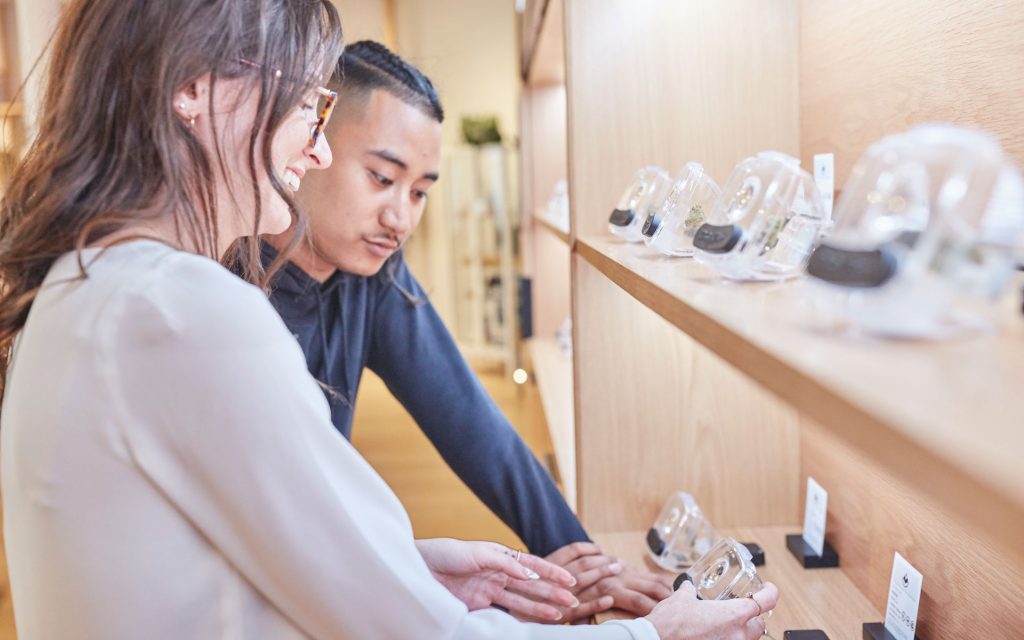
How budtenders can better serve customers and patients
Dispensary staff are crucial to the success of a retail business. Budtenders are the outward face of your brand, and a bad experience with staff can sour a customer on your company for life.
Because staff can make or break the customer experience, incorporating employee training into your regular business practices contributes to a better business. By going over in-house practices and reiterating good customer service, you reinforce the care and attention you expect from your employees for your customers.
Here are some tips to keep in mind when training your staff to give an optimal experience for your dispensary visitors.
Related
How to make a budtending career a reality
Know the difference between a patient and a customer
Cannabis is inherently an unusual market; different states allow different degrees of legality and access, creating two distinct groups: medical patients and adult-use customers.
Patients rely on medical marijuana for improving their health, to treat and alleviate symptoms related to a potentially chronic or intractable condition. Many medical marijuana patients will thus have different needs and preferences than the casual cannabis consumer regarding ingredients, strains, and how intoxicated they want to be.
Their opinions on cannabis may also differ because they may not see cannabis as a recreational activity. They may also have dietary or respiratory needs that limit their options. Adult-use customers tend to shop based on the experience they want to have, by comparison.
Related
Leafly’s guide to marijuana legalization
If your dispensary caters to both medical patients and adult-use customers, consider relegating a private space where patients can consult budtenders for advice on certain conditions or symptoms. This makes them feel more comfortable, and may better address their needs.
Medical ailments are a very sensitive topic and personal information, so patients may not want to discuss them publicly at the dispensary counter with customers waiting behind them in line.
Even if your dispensary isn’t strictly medical, make sure experienced staff with wide knowledge of cannabis medicine help patients. This is up to the discretion of the managers, of course, but patients are there for a specific and often urgent need. Their symptoms and conditions should be treated with respect and sincerity.
Ask questions (but don’t pry)
For a first-time customer, start with the basics. Ask them what kind of effect or experience they want—uplifting or sleepy, casual or intense? Do they prefer to smoke or are they looking for a non-inhalation products like edibles? No need to dive into complex terpenes or cannabinoids for now, unless they show an interest.
Related
Is the Cannabis Community Ignoring Its LGBTQ Customers?
With many adult-use consumers, getting to know them helps you get familiar with their tastes and habits. For a newbie who doesn’t want to smoke, you can steer them towards an alternative, like a vape pen or tincture. More experienced consumers can often tell you exactly which products they like, and you can make suggestions from there.
For patients, however, the experience can be a bit trickier. Finding the right cannabis product for a patient’s conditions often means delving into their medical history and past treatments. A patient may be less than forthcoming and might not want to discuss medical ailments in detail.
Don’t push them; instead, let them tell you what they’re hoping to accomplish with medical cannabis and base your recommendations on what they choose to share with you.Focus your queries on their symptoms and the products you have in-store.
Know your products
To best serve your customers and patients, you have to maintain a base knowledge of your dispensary menu and what the products do. Sample the different strains and test the edibles, vape cartridges, and topicals your dispensary carries on a regular basis.
Dispensaries in adult-use states often provide samples to budtenders and employees so they can speak from experience with customers and patients. Nothing turns off a potential customer more than a blank stare when they ask about a terpene profile or a new product on display.
Beyond trying all the new indicas, sativas and hybrids, spend time learning about the endocannabinoid system, the major cannabinoids, and how THC and CBD interact with the brain and body. Understanding the biological aspects of the products helps you determine how they might affect consumers.
This knowledge will help legitimize you as a trustworthy, respected source among new customers and patients, and it will also earn you the respect of anyone well-versed in the cannabis realm.
Follow the rules of customer service

Don’t be rude, and don’t make assumptions about your customers, whether it’s about how much money they have to spend or how they plan to consume their products.
Refrain from using a condescending tone, especially with first-timers and newbies. These people took a leap of faith walking into a cannabis shop, and a negative experience with a rude budtender can set them running in the opposite direction.
Serving your customers boils down to a few basic tenets: Be courteous, efficient, and friendly.
Keep it clean. Hygiene and a clean workplace are crucial to the impression your business makes on customers, especially after a pandemic. Wash your hands, before and after handling cannabis products (particularly in states where cannabis is still dispensed from large jars), or wear gloves. Keep in mind that your personal odor (perfumes and colognes included) may affect the scent of the cannabis.
Most importantly, don’t be too stoned to do your job well. Even if your employer allows consumption during work hours, don’t let your high undermine your interactions with patients and customers. If you know you can’t consume cannabis while being a productive, functional employee, wait until after your shift to toke up.
Ultimately, being a good budtender comes down to respect. Respect your fellow coworkers, your customers and patients, and the products you carry. A little respect goes a long way in making a good impression to your clientele.

Post a comment: